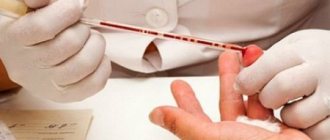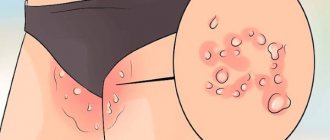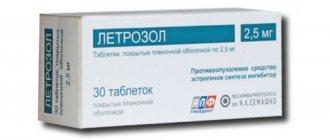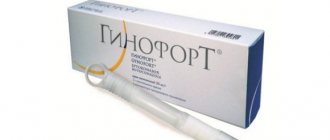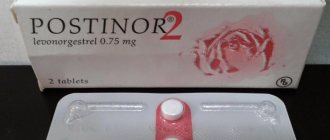Ladybon - instructions for use, price, reviews from women and doctors - the main points that interest women who are faced with the problem of menopause. The drug helps women go through the difficult stage of declining reproductive functions without any particular difficulties. Ladybon for menopause is one of the first medications recommended by doctors.
The beginning of menopause
In simple terms, this is the end of menstruation. But in reality, everything is not so simple. The body is undergoing serious hormonal changes. Lady Bon, a medicine for menopause, will help you cope with this difficult task. You will learn more about its indications, reviews, and side effects from our article.
The age at which menopause occurs varies. But on average it ranges from 45 to 50 years. At this time, the metabolism in the body slows down, hormonal changes occur, and “female” diseases, which hardly bothered us in our youth, worsen. It is believed that reproductive function declines during this period. Now the woman practically does not need it, since she will no longer have to bear or give birth to children. The body is independently preparing for restructuring in a new way.
Difficult period
During the second stage, which begins after about a year and a half, some symptoms subside. Gradually the body adapts to new conditions. Now menstruation almost never appears, and diseases such as fibroids or ovarian cysts go away along with them. This happens because estrogen drops to critically low levels. "Lady Bon" is a medicine for menopause that will help maintain hormone production.
The entire period can last from four to five years. Some women complain of pain when urinating. Others experience severe itching and dryness in the vagina. And hormones are to blame here. They play such an important role in the life of the fair half of humanity that when their level changes, women experience a rather difficult period. After the cessation of menstruation, a stage called postmenopause begins. The body, having rebuilt itself, ceases to experience stress. All side effects of this condition go away.
How does the medicine work?
This is one of the remedies that relieves symptoms during menopause. It prevents hot flashes and night sweats. Taking it relieves headaches and strengthens bones. "Lady Bon" is a medicine for menopause, which has good reviews.
The medication will relieve women from the risk of developing osteoporosis. This disease manifests itself when the body urgently needs an important hormone - estrogen. During this period, many people get broken bones with minor bruises. The worst thing, as you know, is a fracture of the femoral neck, from which it is very difficult to recover.
The general condition and well-being of women also improves. Insomnia disappears, a good mood appears. These pills help the body cope more easily with the transition to a new stage. They gradually feed it with a small dose of hormones. While taking it, menstruation continues. However, they may not last as long as before. What is important is that the drug restores libido. Just during menopause, women lose all desire. This remedy will bring love and peace to your family.
special instructions
Ladybon for menopause is prescribed based on the existing undesirable symptoms that worsen the woman’s quality of life, the presence of diseases, taking into account the individual characteristics of the body. In the event that the benefits of taking the pills significantly outweigh the health risks. Every year a woman should undergo examination. The specialist assesses her health status and decides on further therapy or discontinuation of the drug.
Ladybon during menopause is canceled urgently if:
individual intolerance was discovered;
- jaundice appeared;
- liver function worsens;
- blood pressure suddenly increases, which was not previously observed;
- severe headache and migraine appeared.
During the first 3 months of therapy, slight bleeding from the vagina is observed, which is not a reason to discontinue treatment. If blood appears 6 months after the start of therapy, does not stop for more than six months, and is present after discontinuation of the drug, you should seek help from a specialist. Often in such cases, endometrial cancer is diagnosed.
Ledibon is prescribed with caution during menopause, renal and liver failure.
"Ladybon" (tablets): analogues and price of the medicine
Almost every drug has an identical generic version. This is the name given to analogues of well-known drugs that cost less than the original. For example, “Lady Bon” is a medicine for menopause, the price of which is quite high. For a pack of twenty-eight tablets you will have to pay about a thousand rubles. If you want to buy a large pack of eighty-four pills, you will spend 2,500 rubles.
Moreover, this drug is considered one of the most inexpensive. The similar “Levial” costs much more: almost two thousand for 28 pieces. It has the same spectrum of action. Many consider it more effective than Lady Bon. It is noted that side effects are less pronounced. It is taken in the same way as any similar drug.
Another analogue of this medicine is Femoston. By replenishing the lack of hormones, this remedy will relieve hot flashes and headaches. Estradiol included in its composition will prolong productive function. Menstruation will continue throughout your appointment. When they stop, you can reduce the dosage of Femoston and continue to drink it to maintain youth and beauty. For a pack of tablets you will pay from eight hundred to nine hundred rubles. At the moment it is considered one of the most affordable.
The next analogue is “Proginova”. It differs from its “brothers” in that its blister contains only twenty-one tablets. In terms of pharmacological action, it is no different. This drug is a drug that replaces such an important estrogen. The price is very attractive: you need to pay about four hundred rubles for a package.
Now we know what generics Ladybon (tablets) have. Reviews, descriptions, analogues, price - all this is covered in detail in our article. However, remember that you should not treat yourself under any circumstances. Any medicine is prescribed only by a doctor based on the necessary tests
Cost of the drug
The product is available in pharmacies with a prescription. Shelf life: 2 years from date of manufacture. You can buy it at any pharmacy. Cost may vary. It depends solely on the location of the pharmacy and the pricing policy of the establishment. The average price of 1 plate with 28 tablets is 900 rubles. A package of 84 tablets costs about 2,700 rubles.
Analogues of the drug are Femoston, Proginova, Velledien, Livial.
Indications
You can feel the moment when you should start taking replacement therapy. As soon as the first signs of menopause begin: headaches, cycle disruption, hot flashes, you need to start taking action. In addition, our pharmacies sell special tests that will tell you whether you have estrogen deficiency. "Lady Bon" is a medicine for menopause, the indications for which will be prescribed by a doctor. It is recommended to start taking these pills at the very beginning, during the so-called perimenopause. When menstruation has not yet stopped, but all the signs of incipient menopause have already begun to appear.
If you did not consult a gynecologist in time, then you can take this medicine at any stage of the menopause. Some go to the appointment when problems with the skeletal system begin. Women are concerned about osteoporosis. It is expressed in weakening of bone tissue, pain in the joints, fragility and fractures.
What do the doctor's say
The opinion of experts is that you can take the drug during menopause for 7 years. The therapy does not provide for a temporary break. Clients who independently decide to stop treatment note the return of climatic symptoms already from the first month. In the absence of side effects, there is no point in stopping the pills, but an annual examination is mandatory, even if nothing bothers you. You should do a mammogram, examination by a gynecologist, and an ultrasound of the pelvic organs. It is also not worth switching to herbal preparations. They are ineffective. Many patients ask the question of how much to take the drug during menopause if they already feel well. For each woman, the timing is determined by a specialist; they are individual. The longest therapy lasts 7 years. Dose adjustment may be required. When women take not 1 tablet per day, but ¼ of it.
If you have used Ladybon, leave your reviews in the comments to the article, they will be useful to other women after 40 years of age and beyond!
Instructions for use
Many women prefer Lady Bon. Medicine for menopause has its own dosage regimen. It is simple: take one tablet at the same time every day. At first, some people notice increased swelling, but it goes away over time. The main thing is not to skip taking this remedy. Hormones must be supplied to the body regularly. With any, even short-term, withdrawal, bleeding may occur. If you forget to take a pill, try to take it within the next twelve hours. After the pack is finished, take a break for 2 days and continue taking it again.
Contraindications
You should not take this drug if:
- You are prone to allergies. Read the ingredients carefully and make sure that it does not contain any substances to which you react poorly.
- You have problems with your veins. This can be either varicose veins or thrombophlebitis.
- There are liver and kidney diseases.
- There is a history of heart or vascular disease.
- There is currently bleeding that is not menstrual.
- You are already taking a similar drug. It is prohibited to use it simultaneously with other hormonal drugs!
- There is a pregnancy.
Side effects
"Lady Bon" is a medicine for menopause, which has some negative consequences. Among them are dizziness, blurred vision, and drowsiness. In the gastrointestinal tract, abdominal pain and nausea are noted. In rare cases, women complain of diarrhea. Any side effects usually appear at the very beginning of use. Among these, women highlight swelling, especially of the legs. This occurs due to temporary water retention in the body while taking the drug.
Some notice how their body weight changes. Not necessarily in a positive way. Sometimes women lose pounds. Facial hair may appear, and skin itching may also occur. If these “side effects” do not go away over time, you should consult a doctor to replace this drug with a similar one.
Ladybon®
Ladybon® is not intended for use as a contraceptive and does not protect against unwanted pregnancy. The decision to start taking Ledibon® should be based on an assessment of the benefit/risk ratio, taking into account all individual risk factors, and in women over 60 years of age, the increased risk of stroke should also be taken into account.
For the treatment of postmenopausal symptoms, Ledibon® should be prescribed only for symptoms that adversely affect quality of life. In all cases, it is necessary to conduct a thorough assessment of the risks and benefits of therapy at least once a year, and therapy with Ledibon® should be continued only for a period of time when the benefits of therapy outweigh the risks. It is necessary to carefully assess the risk of stroke, the risk of developing breast cancer and endometrial cancer in each woman with an intact uterus (see section “Side effects”), taking into account all individual risk factors, the incidence and characteristics of both types of cancer and stroke in terms of curability , morbidity and mortality. Evidence of the relative risk associated with hormone replacement therapy (HRT) or tibolone use for the treatment of premature menopause is limited. However, the benefit/risk ratio may be more favorable in women with premature menopause than in older women due to the lower absolute risk in younger women.
Medical examination/observation Before starting or resuming therapy with Ladybon®, an individual and family medical history should be obtained.
Physical examination (including examination of the pelvic organs and mammary glands) should be carried out taking into account medical history, absolute and relative contraindications. During therapy, preventive repeat examinations are recommended, the frequency and nature of which are determined by the individual characteristics of the patient, but at least once every 6 months. In particular, the woman should be informed about the need to inform the doctor about changes in the mammary glands.
Examinations, including appropriate imaging modalities such as mammography, should be performed according to a currently accepted examination regimen, adapted to the clinical needs of each patient, but at least every 6 months. Reasons for immediate discontinuation of therapy and immediate consultation with a doctor Therapy should be discontinued if a contraindication is identified and/or for the following conditions/diseases:
- jaundice or worsening liver function;
- a sudden increase in blood pressure that differs from the patient’s usual blood pressure readings;
- the occurrence of migraine-type headaches.
- Hyperplasia and endometrial cancer
Data from randomized controlled clinical trials are conflicting, but observational studies have shown an increased risk of endometrial hyperplasia or cancer in women taking tibolone (see also section "Side effects"). These studies have shown that the risk of endometrial cancer increases with duration of drug use, and tibolone may increase endometrial thickness as measured by transvaginal ultrasound.
During the first months of treatment, breakthrough bleeding and spotting may occur.
If spotting/bleeding occurs during the use of Ledibon®,
- which last more than 6 months from the start of taking the drug,
- begin 6 months after starting use of the drug Ledibon® and continue even after the patient has stopped using the drug Ledibon®,
You should consult a doctor - this may be a sign of endometrial hyperplasia.
Mammary cancer
Data from various clinical studies from the point of view of evidence-based medicine regarding the risk of developing breast cancer when taking tibolone are contradictory, and further research is required.
Ovarian cancer
Ovarian cancer is much less common than breast cancer.
Long-term (at least 5-10 years) estrogen replacement monotherapy was associated with a slight increase in the risk of developing ovarian cancer.
Some studies, including the Women's Health Initiative study, suggest that long-term HRT combination therapy may have a similar or slightly lower risk.
The Million Women Study showed that the relative risk of ovarian cancer with tibolone was similar to the risk associated with other types of HRT.
Venous thromboembolism HRT preparations containing only estrogens, or combination preparations containing estrogen and a progestogen, may increase the risk of venous thromboembolism (VTE) (i.e. deep vein thrombosis or pulmonary embolism) by 1.3-3 times, in especially during the first year of use (see section “Side effects”).
In an epidemiological study using UK databases, the risk of VTE associated with tibolone was lower than the risk associated with traditional HRT drugs, but due to the fact that only a small proportion of women were taking tibolone at that time, it is not possible exclude a slight increase in risk compared to women who did not take tibolone. Patients with known thrombophilic conditions are at increased risk of developing VTE, and tibolone may increase this risk and is therefore contraindicated in this patient population (see Contraindications).
Risk factors for VTE include estrogen use, older age, major surgery, prolonged immobilization, obesity (body mass index (BMI) >30 kg/m2), pregnancy and the postpartum period, systemic lupus erythematosus and cancer. In patients after surgical interventions, special attention should be paid to preventive measures to prevent VTE in the postoperative period. If prolonged immobilization is necessary after surgery, it is recommended to temporarily stop taking Ledibon® 4-6 weeks before surgery. Treatment should not be resumed until the woman regains motor activity. Women who do not have a history of VTE, but who have first-degree relatives with a history of thrombosis at a young age, may be offered screening (the woman should be informed that screening detects only a subset of thrombophilic conditions). If a thrombophilic condition is identified that is separate from thrombosis in relatives, or a serious disorder (for example, deficiency of antithrombin III, protein S, protein C, or a combination of disorders), taking Ledibon® is contraindicated.
For women already receiving anticoagulant treatment, careful consideration of the benefit/risk of using HRT or tibolone is required.
If VTE develops after starting treatment, the drug should be discontinued. Patients should be advised to seek immediate medical attention if symptoms of potential thromboembolism occur (eg, pain and unilateral swelling of the lower extremity, sudden chest pain, shortness of breath). Coronary heart disease (CHD)
Randomized controlled trials did not provide evidence of protection against myocardial infarction in women with or without coronary artery disease who received HRT with combined drugs (estrogen/progestogen) or drugs containing only estrogen.
Epidemiological studies using the GPRD did not provide evidence of protection against myocardial infarction in postmenopausal women who received tibolone. Ischemic stroke Tibolone therapy increases the risk of ischemic stroke, starting from the first year of use (see section “Side effects”). The absolute risk of stroke is strictly dependent on age, and, therefore, this effect of tibolone is greater with increasing age. If you experience unexplained migraine-like headaches with or without visual disturbances, you should consult a doctor as soon as possible. In this case, you should not take the drug until your doctor confirms that it is safe to continue HRT, since such headaches can be an early diagnostic sign of a possible stroke.
Other states
- Tibolone reportedly resulted in a significant dose-dependent reduction in HDL (high-density lipoprotein) cholesterol (from -16.7% at a dose of 1.25 mg to -21.8% at a dose of 2.5 mg after 2 years of use).
- The total concentration of triglycerides and VLDL also decreased. The decrease in the concentration of total cholesterol and VLDL cholesterol (very low density lipoprotein) was not dose dependent. LDL (low-density lipoprotein) cholesterol concentrations did not change. The clinical significance of these data is not yet known.
- Women with pre-existing hypertriglyceridemia should be closely monitored by a physician during tibolone therapy, as rare cases of significant increases in plasma triglyceride levels, contributing to the development of pancreatitis, have been reported during estrogen therapy for this condition.
- Treatment with tibolone results in a very small decrease in thyroxine-binding globulin (TBG) and total T4. The level of total T3 does not change. Ledibon® reduces the level of sex hormone binding globulin (SHBG), while the levels of corticosteroid binding globulin (CBG) and circulating cortisol do not change.
- The increased risk of dementia should be considered when tibolone therapy is initiated in women over 65 years of age.
- While taking Ladybon®, there is a possibility of fluid retention. In this regard, careful monitoring of patients with cardiac or renal failure is necessary.
